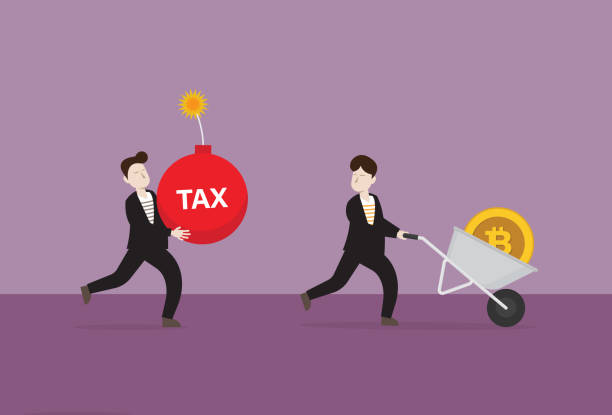Complete Crypto Tax India 2025 Breakdown: What Every Trader Must Know
 Capital gains tax, Bitcoin, Trader, Investment, Paying, Tax
Capital gains tax, Bitcoin, Trader, Investment, Paying, Tax
Crypto Tax India 2025 is something every Indian trader must understand — whether you’re buying Bitcoin, trading futures, or flipping NFTs. If you’re investing or trading crypto in India through platforms like Binance, Bybit, KuCoin, or Indian exchanges like CoinDCX or WazirX, then this guide will help you stay compliant and maximize your earnings.
The Indian government now treats crypto as a taxable digital asset, not a currency. If you’re unaware of how crypto is taxed, you could lose a significant chunk of your profits or even get into legal trouble. Here’s a complete, beginner-friendly guide to help you stay compliant and smart with your crypto journey.
🔶 1. 30% Flat Tax on Crypto Profits
The most important thing to know is:
All profits from crypto trading are taxed at a flat rate of 30%.
✔ Applies to:
-
Spot trading (e.g., buying/selling BTC, ETH)
-
Futures and derivatives
-
NFTs, DeFi tokens
❌ Not Allowed:
-
No deduction of expenses: You can’t subtract internet charges, electricity bills, or other costs.
-
No loss adjustment: Losses from one coin cannot be used to offset profits from another coin or year.
📌 Example:
You made a profit of ₹50,000 from trading Ethereum.
✅ You owe: ₹15,000 as tax (30%)
⛔ You can’t deduct any trading fees or previous year’s losses.
Even if you lose money on another token, you still have to pay the 30% tax on your profitable trades.
🔶 2. 1% TDS on Every Sell Transaction
Starting from FY 2022–23, a 1% TDS (Tax Deducted at Source) is applicable every time you sell crypto, regardless of profit or loss.
✔ Applies to:
-
Spot and futures markets
-
Indian and foreign exchanges
-
Even some P2P transactions
📌 Example:
You sell Bitcoin worth ₹1,00,000.
✅ 1% TDS = ₹1,000 deducted
👉 You receive ₹99,000 in your account.
The TDS deducted will reflect in Form 26AS and can be claimed back when you file your Income Tax Return (ITR).
🔶 3. 18% GST on Exchange Fees
This one surprises many traders.
18% GST is applied on exchange services, not on crypto gains.
This means if you pay fees to a platform (for trading, withdrawals, deposits, etc.), GST is added to that service charge.
📌 Example:
Trading Fee = ₹500
GST = 18% of ₹500 = ₹90
Total charge = ₹590
This applies whether you’re using an Indian platform like ZebPay or a foreign one like KuCoin.
Some platforms automatically add this GST. For others, Reverse Charge Mechanism (RCM) might apply if you’re using foreign services — meaning you pay the tax directly.
🔁 Same Tax Rules for Spot & Futures
Whether you’re doing long-term investing in spot markets or short-term leveraged futures trading, the rules remain the same:
| Aspect | Rule |
|---|---|
| 💰 Profit | 30% Income Tax |
| 💸 Sell Transaction | 1% TDS |
| ⚡ Fees | 18% GST |
🔄 What About Crypto Losses?
Here’s the hard truth for Indian crypto traders:
Losses from crypto CANNOT be set off or carried forward.
-
You cannot use crypto losses to reduce your income from stocks, business, or salary.
-
You cannot use past year losses to reduce current year crypto profits.
This rule is different from stock trading, where capital losses can be adjusted. So make sure to manage your risks properly.
📤 Filing ITR for Crypto in India
If you’ve traded or earned any amount through crypto in 2024–25, you must file your ITR and disclose crypto income under “Income from Other Sources” (Schedule VDA in ITR forms).
Documents You Should Keep:
-
Trade history from exchanges (download CSV)
-
TDS certificate or Form 26AS
-
Fee/GST breakdown
-
Wallet addresses and dates of purchase/sale (if audited)
✅ Filing ITR is mandatory even if your income is below the taxable limit but you earned from crypto.
✅ This also helps you claim back the TDS deducted on every sale.
🌐 Indian vs Foreign Exchanges
Whether you use an Indian exchange (WazirX, CoinDCX, Giottus) or a global platform (Binance, Bybit, OKX):
✅ The same tax rules apply.
✅ But if you’re using foreign exchanges, you may also have to self-declare foreign assets in Schedule FA of the ITR if holdings exceed limits.
Some banks may also ask for details if you move large funds in/out via LRS (Liberalised Remittance Scheme). Keep your transactions documented.
✅ Quick Recap of Crypto Tax Rules India 2025
| Category | Rule |
|---|---|
| 📈 Profits | 30% Income Tax |
| 🔻 Losses | Not allowed to be adjusted |
| 💸 Sell Transaction | 1% TDS |
| 💳 Fees (Service Charges) | 18% GST |
| 🧾 ITR Filing | Mandatory for crypto earners |
| 🌍 Exchange Type | Applies to Indian & foreign exchanges |
💡 Final Tips for Crypto Traders in India
-
Keep a record of every trade and withdrawal.
-
Use crypto tax software like KoinX, ClearTax, or Zerodha Quicko to calculate your exact dues.
-
File your ITR on time (before 31st July) to avoid penalties.
-
Don’t try to hide crypto income — the IT department can track via PAN and UPI-linked wallets.




